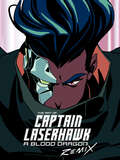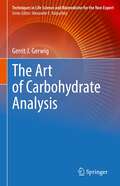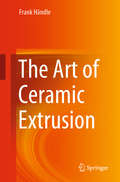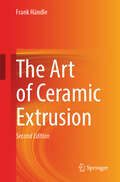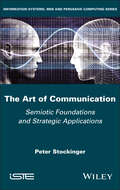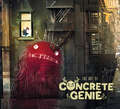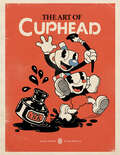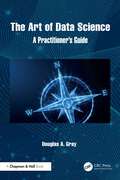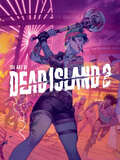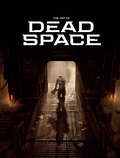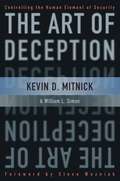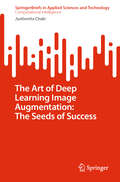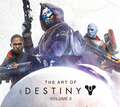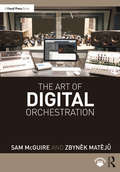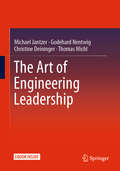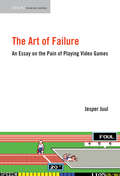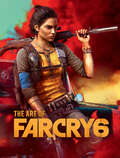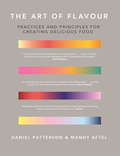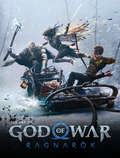- Table View
- List View
The Art of Battletoads
by Chris Allcock Rare Ltd.Celebrate the return of Rash, Zitz, and Pimple in this immense, 192-page art book for Rare Ltd. and Dlala Studios&’ thrashing beat-em-up adventure, Battletoads! Drop into vibrant illustrations of the game&’s heroes, villains, and environments that evoke nineties cartoon nostalgia! Hop in and race through a wealth of production materials from early concept art to finely tuned combat and mission structure throughout late development stages. This book is filled to the brim with unique development insights and also revisits the franchise&’s classic titles, which informed an all new, battle-ready era of &‘Toad! Rare Ltd., Dlala Studios, and Dark Horse Books are elated to present The Art of Battletoads, an essential art book whether you&’re a brand new brawlin&’ tadpole or Turbo Tunnel champion of old!
The Art of Being a Scientist
by Roel Snieder Ken LarnerThis is a hands-on guide for graduate students and young researchers wishing to perfect the practical skills needed for a successful research career. By teaching junior scientists to develop effective research habits, the book helps to make the experience of graduate study a more efficient and rewarding one. This book is an outgrowth of the notes for the graduate course, "The Art of Science," taught by the authors at Colorado School of Mines and highly rated and appreciated by students over the years. A sample curriculum, which parallels the curriculum followed in the authors' course, is available in the book as Appendix B, and as an online resource. This sample is offered as a possible starting point for instructors in graduate schools wanting to teach a similar course at their university. Topics covered in the book include: choosing a research topic, department, and advisor; making workplans; the ethics of research; using scientific literature; perfecting oral and written communication; publishing papers; writing proposals; managing time effectively; and planning a scientific career and applying for jobs in research and industry. The wealth of advice is invaluable to students, junior researchers and mentors in all fields of science, engineering, and the humanities.
The Art of Captain Laserhawk: A Blood Dragon Remix
by UbisoftA chronicle collecting concept art and creator commentary from the development of the hyper-meta animated Netflix series.In the dark future of 1992, the country formerly known as the USA is now called Eden—a technocracy ruled by propaganda and corruption. Super-soldier Dolph Laserhawk has just been betrayed by the love of his life and locked up in Eden's top-security prison, Supermaxx. He must now lead a team of rebel outcasts on risky undercover missions in order to survive.Captain Laserhawk is a self-reflexive animated series alternate &“Ubiverse&” featuring alternative twisted versions of iconic Ubisoft characters in a vibrant and geeky style. This art book presents the making of the first season of the satirical and self-aware adventure with exuberant concept art, intimate creator commentary, and a look inside the studio. Journey across Eden and the New Wasteland alongside Dolph Laserhawk with The Art of Captain Laserhawk: A Blood Dragon Remix.
The Art of Carbohydrate Analysis (Techniques in Life Science and Biomedicine for the Non-Expert)
by Gerrit J. GerwigThe growing importance of glycobiology and carbohydrate chemistry in modern biotechnology and the pharmaceutical industry makes accurate carbohydrate analysis indispensable. This book provides the principles and protocols of various fundamental carbohydrate analysis methods. Choice of method is entirely dependent upon the type of material being investigated (biological samples, food products, etc.), and the level of structural detail required, i.e. sugar content, compositional analysis, linkages between the sugar components, or the total chemical structure of a given molecule. Full structural characterization of carbohydrate chains requires significant time, resources, and skill in several methods of analysis; no single technique can address all glycan analysis needs.This book summarizes several existing analytical techniques (both chemical and physical) in an introductory volume designed for the non-expert researcher or novice scientist. While background in carbohydrate chemistry is assumed, all information necessary to understanding the described techniques is addressed in the text.
The Art of Ceramic Extrusion
by Frank HändleThis book is ideal for practitioners and managers with low experience in the field. It introduces the theme of extrusion in ceramics and provides checklists, questionnaires, as well as the related literature and websites covering the topic. This Brief is written in a simple language and covers topics such as honeycombs, ceramic filters, auger geometry, wear and tear.
The Art of Ceramic Extrusion
by Frank HändleThis book offers a thorough exploration of ceramic extrusion, guiding readers from foundational principles to advanced applications. Beginning with an elucidation of the essence of extrusion in ceramics, the book navigates through diverse applications and the intricacies of the ideal extruder, providing readers with essential knowledge for effective implementation. Covering the concept of plasticity in ceramics and the strategic integration of additives, the book provides the necessary tools to optimize extrusion processes. Furthermore, it explores the role of simulation in enhancing productivity and performance, lists the design considerations and practical applications of piston extruders, and shows innovative possibilities of additive manufacturing by extrusion. It provides a series of engaging exercises, reinforcing learning and fostering practical application. This second edition builds upon its predecessor, offering expanded coverage and updated content to reflect the latest advancements in the field.
The Art of Communication: Semiotic Foundations and Strategic Applications (ISTE Invoiced)
by Peter StockingerThe Art of Communication combines over two decades of research and teaching into a comprehensive guide on strategic communication. Grounded in the theoretical and methodological frameworks of 'situated communication' and 'communication project', this book highlights an understanding of both traditional and emerging communication practices. It particularly focuses on new genres, such as branding, design and digital communication strategies, and introduces the innovative concept of 'textscapes' – specially crafted environments to fulfill communicative objectives. This book is enriched with practical examples and is particularly relevant in multicultural and international settings, providing essential insights for adapting communication strategies to diverse cultural contexts.
The Art of Concrete Genie
by PixelOpusWalk among the mysterious streets of Denska and collect the real pages of artwork behind PixelOpus' endearing video game Concrete Genie!This art book studies the power of self-expression, creativity and the game's core fantasy of making anyone believe they can be an artist - just like the talented protagonist of the game, Ash. Return to the characters, monsters, and lore of Denska to uncover the secrets behind PixelOpus' 'living paint' mechanics that allow the walls of Denska to come to life with player creations. Witness a special, behind-the-scenes look at the development of Concrete Genie from the small and passionate team that brought it to life.From the developers of a truly empowering journey about oppression and creativity, Dark Horse Books and PixelOpus are delighted to present The Art of Concrete Genie! This art book collects heart-warming, magnificent illustrations for fans of Ash and his wildly varied 'living paint' creations within Concrete Genie.
The Art of Cuphead
by Studio MDHRGet transported back to the golden age of 1930s animation with an art book celebrating the acclaimed run & gun game, Cuphead!Each page of this curated collection of artwork is designed to capture the vintage look and feel of the 1930's. Take a gander at the game's traditional hand-drawn frame-by-frame animation. Peek at the early concepts, production work, and early ideas that went into the making of Cuphead's characters, bosses, stages and more including never-before-seen content from the upcoming DLC! Relive the most cherished and challenging moments of Cuphead and Mugman's adventure to reclaim their souls from The Devil, all in a way you've never seen before! Guided by personal insights from game directors Chad and Jared Moldenhauer, take a one-of-a-kind trip through the Inkwell Isles and discover an all-new appreciation for Cuphead's animation style and challenging retro gameplay.Dark Horse Books and Studio MDHR are thrilled to present The Art of Cuphead! This vintage-style art extravaganza is the perfect book for fans of Cuphead!
The Art of DOOM: Eternal
by Bethesda Softworks ID SOFTWAREA full-color digital art book containing concept art and commentary from the development of DOOM Eternal, the next entry in the iconic first-person shooter series.The newest chapter in the quintessential game franchise from id Software is here. Witness DOOM Eternal! This epic volume explores the art and development of the hotly anticipated sequel to the 2016 Game Award-winner for Best Action Game! Explore the twisted demonic invasion of Earth, the cultist UAC facilities, and plunge into otherworldly and unknown locations new to the DOOM universe. Admire the dangerous glimmering edges of the Slayer's arsenal and armor. Examine the ancient designs and breeds of Hell's soldiers and lords--all in gloriously designed full color images straight from the files of the game's artists themselves! Dark Horse Books and id Software join forces to present The Art of DOOM Eternal, encompassing every detail you've come to love from DOOM!
The Art of Data Science: A Practitioner's Guide
by Douglas A. GrayAlthough change is constant in business and analytics, some fundamental principles and lessons learned are truly timeless, extending and surviving beyond the rapid ongoing evolution of tools, techniques, and technologies. Through a series of articles published over the course of his 30+ year career in analytics and technology, Doug Gray shares the most important lessons he has learned – with colleagues and students as well – that have helped to ensure success on his journey as a practitioner, leader, and educator.The reader witnesses the Analytical Sciences profession through the mind’s eye of a practitioner who has operated at the forefront of analytically inclined organizations, such as American Airlines and Walmart, delivering solutions that generate hundreds of millions of dollars annually in business value, and an educator teaching students and conducting research at a leading university. Through real‑world project case studies, first‑hand stories, and practical examples, we learn the foundational truth underlying successful analytics applications. From bridging theory and practice, to playing a role as a consultant in digital transformation, to understanding how analytics can be economically transformational, identifying required soft skills like leadership skills, and understanding the reasons why data science projects often fail, the reader can better visualize and understand the nuanced, multidimensional nature of Analytical Sciences best practices, projects, and initiatives.The readers will gain a broad perspective on where and how to find success with Analytical Sciences, including the ability to ensure that we apply the right tool, at the right time and right place, and sometimes in different industries.Finally, through the author’s own career synopsis on becoming a practitioner and leader, and his distilled insights, the reader is offered a view into the future that analytics holds, along with some invaluable career advice regarding where to focus, how to make good choices, and how to measure success individually and organizationally.
The Art of Days Gone
by Bend StudioA masterfully designed book collecting over 200 pages of art and commentary from the creators of the brutal and thrilling Days Gone!Set in the beautiful and rugged landscape of the Pacific Northwest high desert, a global pandemic has wreaked havoc on everyone and everything in sight. Now, former outlaw biker turned bounty hunter Deacon St. John must fight for survival against all odds. Witness the creation of Deacon's epic adventure with The Art of Days Gone! From Dark Horse Books and Bend Studio (Syphon Filter, Resistance: Retribution, Uncharted: Golden Abyss), The Art of Days Gone takes an unflinching look at the lovingly detailed production of this hugely anticipated game, featuring hundreds of pieces of concept art and exclusive commentary directly from the team who created it!
The Art of Dead Island 2
by Alex CalvinI Love HELL-A!This gory volume is dripping with insights showing just how the video game world of Dead Island 2 came to life!Featuring never before seen concept art on each of the Slayers, their gear and weapons, the ruined and iconic streets of post-outbreak Los Angeles, and the shambling hordes of dangerous undead that call them home! Also, this book showcases insights from the creators of the game, with captions and text written by Alex Calvin (Runescape: The First 20 Years).Dark Horse Books, Deep Silver, and Dambuster Studios proudly present: The Art of Dead Island 2!
The Art of Dead Space
by Motive StudioIsaac Clarke isn&’t a warrior or soldier. He&’s an engineer on the USG Ishimura, and the last line of defense for humanity.Join us in celebrating the art of the 2023 smash-hit Dead Space—the completely rebuilt sci-fi survival-horror classic. Pore over details, small and large, that expand and improve the original game&’s thrilling vision. Explore the claustrophobic hallways of the Ishimura, alien landscape of Aegis VII, iconic engineering suits, tools, weapons, characters, and gruesome necromorphs presented on beautiful, high-quality paper stock so you don't miss any element of this faithful and terrifying ground-up remake.
The Art of Deception: Controlling the Human Element of Security
by Kevin D. Mitnick William L. SimonInviting you into the complex mind of the hacker, Mitnick provides realistic scenarios of cons, swindles, and social engineering attacks on businesses--and the consequences. Focusing on the human factors involved with information security, Mitnick explains why all the firewalls and encryption protocols in the world will never be enough to stop a savvy grifter intent on rifling a database or an irate employee determined to crash a system. He illustrates just how susceptible even the most locked-down information systems are to a determined con artist impersonating an IRS agent or any other seemingly innocent character. Narrated from the points of view of both the attacker and the victim, The Art of Deception explores why each attack was so successful--and how it could have been averted--in an engaging and highly readable manner reminiscent of a true-crime novel.
The Art of Deep Learning Image Augmentation: The Seeds of Success (SpringerBriefs in Applied Sciences and Technology)
by Jyotismita ChakiThis book addresses the critical challenge of limited training data in deep learning for computer vision by exploring and evaluating various image augmentation techniques, with a particular emphasis on deep learning-based methods. Chapter 1 establishes the core problem of data scarcity, outlining its negative impacts on model performance, and introduces traditional image augmentation techniques like geometric transformations, color space manipulations, and other methods such as noise injection. It highlights the limitations of these traditional approaches, including limited variation, lack of control, and inability to introduce new information, before introducing the advantages of deep learning-based augmentation, such as superior control, task adaptability, enhanced realism, and automation. Chapter 2 delves into GAN-based image augmentation, discussing how GANs generate realistic synthetic images for various applications like super-resolution and image-to-image translation, while also addressing the challenges associated with GAN training and potential future directions. Chapter 3 explores autoencoder-based image augmentation, covering techniques like VAEs, DAEs, and AAEs, and highlighting architectural considerations and challenges such as overfitting. Chapter 4 showcases the diverse applications of deep learning-based image augmentation and how it enhances various computer vision tasks by improving generalization, robustness, and accuracy. Chapter 5 discusses strategies for evaluating and optimizing deep learning image augmentation, including traditional metrics, image quality metrics, and hyperparameter tuning techniques. Finally, Chapter 6 explores cutting-edge advancements, covering AutoAugment, interpretable augmentation, attention-based augmentation, counterfactual augmentation, and human-in-the-loop augmentation, emphasizing the role of human expertise in creating high-quality augmented data.
The Art of Destiny, Volume 3
by Michael OwenImmerse yourself in the stunning, dynamic world of Destiny with never-before-seen art and exclusive interviews from the Bungie team.The Art of Destiny, Volume 3 is a celebration of the stunning, dynamic visual style beloved by Destiny fans. Featuring hundreds of pieces of concept art, the book picks up where the previous volume left off in 2017. It features everything from early sketches and illustrations of characters, to paintings of sweeping vistas used to shape the in-game worlds. With stunning imagery, interviews with the development team, and more, The Art of Destiny, Volume 3 is a must-have for Guardians everywhere! ORIGINAL CONCEPT ART: Includes many never-before-seen concept art of the various Alien tribes, including: the Fallen, the Hive, the Vex, the Cabal, and the Taken. EXCLUSIVE INTERVIEWS: Hear from the development team and creators of Destiny as they delve deeper into the Light and Darkness saga. PEOPLE, PLACES, AND WEAPONS: Experience an in-depth look at the compelling characters, detailed environments, and incredible weaponry that brings the war to save our solar system to life. A STUNNING COMPANION: This exquisitely crafted hardcover book is perfect for all Guardians and fans of Destiny. Complete your collection with this gorgeous third volume in the Art of Destiny series.
The Art of Digital Orchestration
by Sam McGuire Zbyněk MatějůThe Art of Digital Orchestration explores how to replicate traditional orchestration techniques using computer technology, with a focus on respecting the music and understanding when using real performers is still the best choice. Using real-world examples including industry-leading software and actual sounds and scores from films, VR/AR, and games, this book takes readers through the entire orchestration process, from composition to instruments, performance tools, MIDI, mixing, and arranging. It sheds light on the technology and musical instrument foundation required to create realistic orchestrations, drawing on decades of experience working with virtual instruments and MIDI. Bringing together the old and new, The Art of Digital Orchestration is an excellent resource for anyone using software to write or compose music. The book includes access to online videos featuring orchestration techniques, MIDI features, and instrument demonstrations.
The Art of Engineering Leadership: Compelling Concepts and Successful Practice
by Thomas Michl Michael Jantzer Godehard Nentwig Christine DeiningerIn times of networking and the growing importance of platform economies, how can products and services be developed that inspire people? Which development methods and organisational forms are promising for this? Leaders and developers will find answers to these questions in this book. With their holistic approach, the authors look at the changing leadership roles that arise in the development of products and services: Is it, for example, about translating new ideas or unknown technologies into high-quality products? Or is it about working efficiently together in an international development alliance? The procedures and models were discussed and further developed in more than 10,000 theoretical and practical workshops with managers at Bosch worldwide. At its core is a leadership model that facilitates discussion and combines the skills needed to master technical issues with those needed to lead people.After an introductory chapter on fundamental questions such as the organization's purpose, values, and strategic goals, key elements of leadership in systems design are introduced, including requirements engineering, architecture design, and model-based development. The following chapters discuss concrete approaches and strategies to- Convert quality attributes,- to reduce risks,- to introduce a review culture, - manage complexity- Process conflicts- Define roles- to build teams.The structure of the book follows the process of developing and implementing strategic goals. However, each chapter can also be read on its own, as it forms a self-contained unit.This book makes the leadership task understandable, discussable and learnable for developers. It thus helps managers to shape change in their own field of work or to grow into a new role.
The Art of Failure: An Essay on the Pain of Playing Video Games (Playful Thinking)
by Jesper JuulAn exploration of why we play video games despite the fact that we are almost certain to feel unhappy when we fail at them. We may think of video games as being "fun," but in The Art of Failure, Jesper Juul claims that this is almost entirely mistaken. When we play video games, our facial expressions are rarely those of happiness or bliss. Instead, we frown, grimace, and shout in frustration as we lose, or die, or fail to advance to the next level. Humans may have a fundamental desire to succeed and feel competent, but game players choose to engage in an activity in which they are nearly certain to fail and feel incompetent. So why do we play video games even though they make us unhappy? Juul examines this paradox. In video games, as in tragic works of art, literature, theater, and cinema, it seems that we want to experience unpleasantness even if we also dislike it. Reader or audience reaction to tragedy is often explained as catharsis, as a purging of negative emotions. But, Juul points out, this doesn't seem to be the case for video game players. Games do not purge us of unpleasant emotions; they produce them in the first place. What, then, does failure in video game playing do? Juul argues that failure in a game is unique in that when you fail in a game, you (not a character) are in some way inadequate. Yet games also motivate us to play more, in order to escape that inadequacy, and the feeling of escaping failure (often by improving skills) is a central enjoyment of games. Games, writes Juul, are the art of failure: the singular art form that sets us up for failure and allows us to experience it and experiment with it. The Art of Failure is essential reading for anyone interested in video games, whether as entertainment, art, or education.
The Art of Far Cry 6
by UbisoftExplore the vibrant island of Yara, a nation trapped in time. Dark Horse Books and Ubisoft have joined forces to create The Art of Far Cry 6, a beautiful volume that is perfect for any fan of the Far Cry adventures. Welcome to Yara. Viva Libertad!
The Art of Flavour: Practices and Principles for Creating Delicious Food
by Mandy Aftel Daniel Patterson'Mandy Aftel's latest work with Daniel Patterson is a masterpiece on the science of cooking from an olfactory and culinary perspective through the same lens. This book is a must for any chef or cook looking to find new inspirations and a deeper understanding of the way flavours work together.' Pratap Chahal (@thathungrychef), Flavour Bastard, Soho, London'Am counting down the days till your book arrives!' Nigella LawsonDaniel Patterson, a chef, and Mandy Aftel, a perfumer, present a revolutionary new approach to creating delicious, original food. Aftel and Patterson are rock stars in their respective fields: Patterson has won two Michelin stars for his San Francisco restaurant Coi and numerous James Beard and other food awards, and his new path-breaking co-venture Loco'l is attracting national interest; Aftel has been profiled in the New York Times T Magazine and other publications and is constantly featured and quoted in magazines and blogs. In a world awash with cooking shows, food blogs and recipes, the art of flavour has been surprisingly neglected. The multibillion-dollar flavour industry practises its dark arts by manipulating synthetic ingredients, and home cooks are taught to wield the same blunt instruments: salt, acid, sugar, heat.But foods in their natural states are infinitely more nuanced than the laboratory can replicate - and offer far greater possibilities for deliciousness. Chef Daniel Patterson and natural perfumer Mandy Aftel are experts at orchestrating ingredients, and here they teach readers how to make the most of nature's palette. The Art of Flavour proceeds not by rote formula but via a series of mind-opening and palate-expanding tools and concepts: using a flavour 'compass' to find the way to transformative combinations of aromatic ingredients; pairing ingredients to make them 'bury' (control) one another and 'lock' (achieve an alchemy that transcends the sum of the parts); learning to deploy cooking methods for maximum effect; and the seven 'dials' that allow a cook to fine-tune a dish. With more than sixty recipes that allow the cook to grasp each concept and put it into practice, The Art of Flavour is food for the imagination that will help cooks at any level to become flavour virtuosos in their own right.From The Flavour Bible on, flavour has been a particular focus of recent interest, but no one has Patterson's and Aftel's unique perspective on it, their combined expertise, or their winning blend of ideas, information, recipes and cooking and perfuming lore. The Art of Flavour is a thinking person's cookbook that uses recipes to instil principles for creating delicious food at home, larded with fascinating information on the history and science of flavour that make it a great armchair read as well.
The Art of Ghost of Tsushima
by Sucker Punch ProductionsOn sale date subject to change.A beautifully realized tome inspired by traditional Japanese aesthetics and featuring art from the delicately crafted video game from Sucker Punch Productions. Dark Horse Books and Sucker Punch Productions are honored to present The Art of Ghost of Tsushima. Explore a unique and intimate look at the Tsushima Islands--all collected into a gorgeous, ornately designed art book.Step into the role of Tsushima Island's last samurai, instilling fear and fighting back against the Mongolian invasion of Japan in the open-world adventure, Ghost of Tsushima. This volume vividly showcases every detail of the vast and exotic locale, featuring elegant illustrations of dynamic characters, spirited landscapes, and diagrams of Samurai sword-fighting techniques, along with a look at storyboards and renders from the most intense, eloquent, and expressive cinematic moments of the game.
The Art of God of War Ragnarök
by Amy RatcliffeThe god of war himself returns in this brand-new installment to the beloved God of War series. As the threat of Ragnarök grows ever closer, Kratos and Atreus find themselves choosing between the safety of their family and the safety of the realms. This passionately assembled tome details a story of parenthood, destiny, and adventure in the voices of the team that brought it to life. <p><p> Dark Horse Books and Santa Monica Studio join forces to present stunning, never-before-seen concept art of the world, characters, creatures, and artifacts with The Art of God of War Ragnarök. See what adventures await in Midgard and beyond.
The Art of Halo Infinite
by Microsoft 343 IndustriesThe Master Chief is back. The legendary super soldier returns in Halo Infinite. 343 Industries and Microsoft are building the biggest and most visually spectacular Halo yet. Halo Infinite debuts on the Xbox family of consoles, including Xbox Series X, Microsoft's latest and most powerful game console. To take full advantage of its prodigious graphical prowess, 343 Industries built an all-new, next-generation game engine, giving their world-class artists the tools and technology to realize the worlds, war, and wonder of the Halo universe in unprecedented style and fidelity. 343 Industries have given Dark Horse access to the art and artists who've brought Halo Infinite to vibrant, vivid life. It's all here in unparalleled detail, the heroes you've grown to love--the Master Chief, the brave soldiers of the UNSC, as well as the weapons, vehicles, villains and vistas--and of course, the eponymous and magnificent environments of Halo itself. The Art of Halo Infinite also features a brand-new cover from legendary concept artist and Halo Infinite's Art Director, Sparth! Join us as we take you from concept to launch inside the artwork of the most ambitious Halo game to date.


